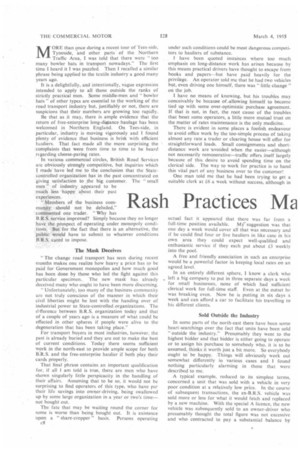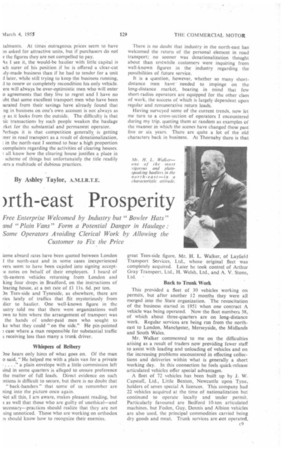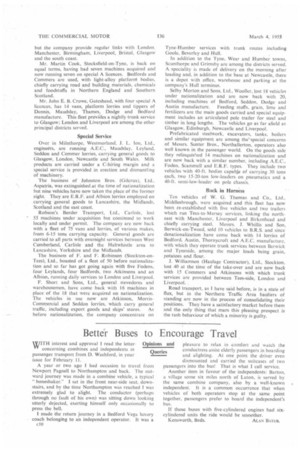Rash Practices Ma
Page 46

Page 47

Page 48

If you've noticed an error in this article please click here to report it so we can fix it.
)rth-east Prosperity Free Enterprise Welcomed by Industry but "Bowler Hats" and "Plain Vans" Form a Potential Danger in Haulage.' Some Operators Avoiding Clerical Work by Allowing the Customer to Fix .the Price By Ashley Taylor, A.M.I.R.T.E. MORE than once during a recent tour of Tees-side, Tyneside, and other parts ' of the Northern Traffic Area, I was told that there were "too many bowler hats in transport nowadays." The first time I heard it I was puzzled. Then I recalled a similar phrase being applied to the textile industry a good many years ago.
It is a delightfully, and intentionally, vague expression intended to apply to all those outside the ranks of strictly practical men. Some middle-men and "bowler hats" of other types are essential to the working of the road transport industry but, justifiably or not, there are suspicions that their numbers are growing top rapidly.
Be that as it may, there is ample evidence that the return of free-enterprise long-di.stance haulage has been welcomed in Northern England. On Tees-side, in particular, industry is moving vigorously and I found plenty of evidence that business is brisk with efficient hauliers. That fact made all the more surprising the complaints that were from time to time to be heard regarding cheese-paring rates.
In various commercial circles, British Road Services are obviously strongly competitive, but inquiries which I made have led me to the conclusion that the State controlled organization has in the past concentrated on giving satisfaction to the big customer. The "small
men" of industry appeared to be much less --happy about their past experiences.
" Members of the business community should not be deluded," commented one trader. "Why has 1B.R.S. service improved? Simply because they no longer have the prospect of operating under monopoly condi
tions. But-for the fact that there is an alternative, the public would have to submit to whatever conditions B.R.S. cared to impose.
The Mask Deceives
"The change road transport has seen during recent months makes one realize how heavy a price has to be paid for Government monopolies and how much good has been done by those who led the fight against this particular specimen. The new mask has already deceived many who ought to have been more discerning.
"Unfortunately, too many of the business community are not truly conscious of the manner in which their civil liberties might be lost with the handing over of industrial power to State-controlled organizations. The d'fference between I3.R.S. organization today and that of a couple of years ago is a measure of what could be effected in other spheres if people were alive to the degeneration that has been taking place."
For transport buyers in most industries, however, the past is already buried and they are out to make the best of current conditions. Today there seems sufficient work in the north-east to provide ample scope for both B.R.S. and the free-enterprise haulier if both play their cards properly.
That final phrase contains an important qualification for, if all I am told is true, there are men who have shown singularly little perspicacity in the handling of their affairs. Assuming that to be so, it would not be surprising to find operators of this type, who have put their life savings into owner-driving, being swallowed up by some large organization in a year or two's time— not bought out.
The fate that may be waiting round the corner for some is worse than being bought out. It is existence upon a " share-cropper " basis. Persons operating c8 under such conditions could be most dangerous competitors to hauliers of substance.
I have been quoted instances where too much emphasis on long-distance work has arisen because by this means practical drivers have thought to escape from books and papers—but have paid heavily for the privilege. An operator told me that he had two vehicles but, even driving one himself, there was "little change" on the job.
I have no means of knowing, but his troubles may conceivably be because of-allowing himself to become tied up with some over-optimistic purchase agreement. If that is not, in fact, the root cause of the troubles that beset some operators, a little more mutual trust on the matter of rates maintenance is the only medicine.
There is evident in some places a foolish endeavour to avoid office work by the too-simple process of taking almost any rate a trader or clearing house will offer for straightforward loads. Small consignments and shortdistance work are -avoided when the easier—although not necessarily remunerative—traffic offers itself largely because of this desire to avoid spending time on the clerical side. The way to work for practice is to hand this vital part of any business over to the customer!
One man told me that he had been trying to get a suitable clerk at £6 a week without success, although in actual fact it appeared that there was far from a
full-time position available. My–suggestion was that one day a week would cover all that was necessary and if he could find four or five hauliers in like case in his own area they could expect well-qualified and enthusiastic service if they each put about £3 weekly into the pool.
A free and friendly association in such an enterprise would be a powerful factor in keeping local rates on an agreed level.
In an entirely different sphere, I know a clerk who left a big company to put in three separate days a week for small businesses, none of which had sufficient clerical work for full-time staff. Even at the outset he was breaking even. Now he is putting in six days a week and can afford a car to facilitate his travelling to his different clients.
Sold Outside the Industry In some parts of the north-east there have been some heart-searchings over the fact that units have been sold "outside the industry." Presumably they went to the highest bidder and that bidder is either going to operate or to assign his purchase to somebody who, it is to be assumed, thinks it worth just a bit more. So everybody ought to' be happy. Things will obviously work out somewhat differently in various cases and I found nothing particularly alarming in those that were described to me.
A typical example, reduced to its simplest terms, concerned a unit that was sold with a vehicle in very poor condition at a relatively low price. In the course of subsequent transactions, the ex-B.R.S. vehicle was sold more or less for what it would fetch and replaced by a new machine. With the special A licence, the new vehicle was subsequently sold to an owner-driver who presumably thought the total figure was not excessive and who contracted to pay a substantial balance by talments. At times outrageous prices seem to have in asked for attractive units, but if purchasers do not e the figures they are not compelled to pay.
ks I see it, the would-be haulier with little capital is tch surer of his position if he is offered a clear-cut .dy-made business than if he had to tender for a unit I later, while still trying to keep the business running, I to renew or completely recondition his only vehicle. ere will always be over-optimistic men who will enter
o agreements that they live to regret and I have no abt that some excellent transport men who have been larated from their savings have already found that ng in business on one's own account is not always as ,y as it looks from the outside. The difficulty is that ic transactions by such people weaken the haulage rkct for the substantial and permanent operator. )erhaps it is that competition generally. is getting iner in road transport as a result of denationalization, in the north-east I seemed to hear a high proportion complaints regarding the activities of clearing houses. all know how the clearing house justifies a place in scheme of things but unfortunately the title readily ters a multitude of dubious practices.
i'ome absurd rates have been quoted between London I the north-east and in some cases inexperienced vers seem to have been cajoled into signing acceptie notes on behalf of their employers. I heard of • th-eastern vehicles returning from London and king four drops in Bradford, on the instructions of learing house, at a net rate of £1 1 is. 6d. per ton.
NI Tees-side and Tyneside, as elsewhere, there are ries lately of traffics that flit mysteriously from flier to haulier. One well-known figure in the ustry told me that there were organizations well awn to him where the arrangement of transport was the hands of under-paid men who sought to ke what they could " on the side." He pin-pointed case where a man responsible for substantial traffic s receiving less than many a trunk driver.
Whispers of Bribery
Me hears only hints of what goes on. Of the man o said, "He helped me with a plain van for a private ..." a plain envelope with a little commission left rind in some quarters is alleged to ensure preference the matter of full loads. Direct evidence on such istions is difficult to secure, but there is no doubt that " back-handers " that some of us remember are ning into the picture once again.
• iot all this, I am aware, makes pleasant reading, but s as well that those who are guilty of unethical—and iecessary—practices should realize that they are not sing unnoticed. Those who are working on orthodox is should know how to recognize their enemies. There is no doubt that industry in the north-east has welcomed the return of the personal element in road transport; no sooner was denationalization thought about than erstwhile customers were inquiring from well-known figures in the industry regarding the possibilities of future service.
It is a question, however, whether so many shortdistance men have • needed to impinge on the long-distance market, bearing in mind that few short-radius operators are equipped for the other class of work, the success of which is largely dependent upon regular and remunerative return loads.
Having surveyed some of the current trends, now let me turn to a cross-section of operators I encountered during my trip, quoting them at random as examples of the manner in which the scenes have changed these past five or six years. There are quite a lot of the old characters back in business. At Thornaby there is that great Tees-side figure, Mr. H. L. Walker, of Layfield Transport Services, Ltd., whose original fleet was completely acquired. Later he took control of Arthur Gray Transport, Ltd., H. Welsh, Ltd., and A. V. Stone, Ltd. •
Back to Trunk Work
This provided a fleet of 30 vehicles working on permits, but after another 12 months they were all merged into the State organization. The resuscitation of the business started in 1951 when one contract A vehicle was being operated. Now the fleet numbers 38, of which about three-quarters are on long-distance work. Regular services are being run from the northeast to London, Manchester, Merseyside, the Midlands and South Wales.
Mr. Walker commented to me on the difficulties arising as a result of traders now providing fewer staff to assist with loading and unloading of vehicles and on the increasing problems encountered in effecting collections and deliveries within what is generally a short working day. In this connection he feels quick-release articulated vehicles offer special advantages.
A fleet of 72 vehicles has been built up by J. W. Capstaff, Ltd., Little Benton, Newcastle upon Tyne, holders of seven special A licences. This company had 22 vehicles acquired at the time of nationalization but continued to operate locally and under permit. Particularly favoured are Bedford 10-ton articulated machines, but Foden, Guy, Dennis and Albion vehicles are also used, the principal commodities carried being dry goods and meat. Trunk services are cot operated. but the company provide regular links with London, Manchester, Birmingham, Liverpool, Bristol, Glasgow and the south coast.
Mr. Martin Cook, Stocksfield-on-Tyne, is back on equal terms, having had seven machines acquired and now running seven on special A licences. Bedfords and Commers are used, with light-alloy platforni bodies. chiefly carrying road and building, materials, chemicals and foodstuffs in Northern England and Southern Scotland.
Mr. John E. B. Crowe, Gateshead, with four special A licences, has 14 vans, platform lorries and tippers of Dennis, Maudslay, Thames, Dodge and Bedford manufacture. This fleet provides a nightly trunk service to Glasgow; London and Liverpool are among the other principal districts served.
Special Service Over in Milnthorpe, Westmorland, J. L. Ion, Ltd., engineers, are running A.E.C., Maudslay, Leyland, Seddon and Commer lorries, carrying general goods to Glasgow, London, Newcastle and South Wales. Milk products are carried under a C-hiring margin and a special service is provided in erection and dismantling of machinery.
The business of Johnston Bros. (Gilcrux), Ltd., Aspatria, was extinguished at the time of nationalization but nine vehicles have now taken the place of the former eight. They are E.R.F. and Albion lorries employed on carrying general goods to Lancashire, the Midlands. Scotland and the east coast.
Robson's Border Transport, Ltd., Carlisle, lost 55 machines under acquisition but continued to work locally and under permit. The company are now back with a fleet of 75 vans and lorries, of various makes, from 6-15 tons carrying capacity. General goods are carried to all parts with overnight services between West Cumberland, Carlisle and the Haltwhistle area to Lancashire, Yorkshire and the Midlands.
The business of F. and F. Robinson (Stockton-onTees), Ltd., boasted of a fleet of 50 before nationalization and so far has got going again with five Fodens, four Leylands, four Bedfords, two Atkinsons and an Albion, running daily services to London and Liverpool.
F. Short and Sons, Ltd., general stevedores and warehousemen, have come back with 16 machines in place of the 18 that were acquired on nationalization. The vehicles in use now are Atkinson, MorrisCommercial and Seddon lorries, which carry general
traffic, including export goods and ships' stores. As before nationalization, the company concentrate on Tyne-Humber services with trunk routes including Goole. Beverley and Hull.
In addition to the Tyne, Wear and Humber towns, Scunthorpe and Grimsby are among the districts served. A speciality is made of delivery on the morning after loading and, in addition to the base at Newcastle, there is a depot with office, warehouse and parking at the company's Hull terminus.
Selby Morton and Sons, Ltd., Wooller, lost 18 vehicles under nationalization and are now back with 20, including machines of Bedford, Seddon, Dodge and Austin manufacture. Feeding stuffs. grain, lime and fertilizers are the main goods carried and special equipment includes an articulated pole trailer for steel and timber in long lengths. The vehicles go as far afield as Glasgow, Edinburgh, Newcastle and Liverpool.
Prefabricated steelwork, excavators, tanks, boilers and similar equipment are among thespecial concerns of Messrs. Sunter Bros., Northallerton, operators also well known in the passenger world. On the goods side they relinquished 14 machines on nationalization and are now back with a similar number, including A.E.C., Foden. Scammell and E.R.F. types. They include two vehicles with 40-ft. bodies capable of carrying 30 tons each, two 15-20-ton low-loaders on pneumatics and a 40-ft. semi-low-loader on pole chassis.
Back in Harness Ten vehicles of W. G. Thomas and Co., Ltd,. Middlesbrough, were acquired and this fleet has now been re-established with five vehicles and two trailers which run Tees-to-Mersey services, linking the northeast with Manchester, Liverpool and Birkenhead and chiefly carrying steel. Messrs. J. Whillis and Son, Berwick-on-Tweed, sold 10 vehicles to B.R.S. and since denationalization have come back with 14 lorries of Bedford, Austin, Thornycroft and A.E.C. manufacture, with which they operate trunk services between Berwick and Tyneside, among the major loads being grain, potatoes and flour.
J. Williamson (Haulage Contractor), Ltd., Stockton, lost 40 at the time of the take-over and are now back with 15 Commers and Atkinsons with which trunk services are provided between Tees-side, London and Liverpool.
Road transport, as I have said before, is in a state of flux, but in the Northern Traffic Area hauliers of standing are now in the process of consolidating their positions. They have a satisfactory market before them and the only thing that mars this pleasing prospect is the rash behaviour of which a minority is guilty.












































































































